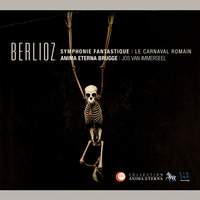Recording of the Week,
Berlioz's Symphonie fantastique
This week I’d like to talk about a new recording of Berlioz’s Symphonie Fantastique from the Flemish period-instrument orchestra Anima Eterna and their principal conductor Jos van Immerseel. Berlioz was just 27 when he wrote this great masterpiece in 1830. It was just three years after Beethoven had died, but inhabits an almost completely different time. This symphony is remarkable in so many different respects – it is programmatic (portraying the life of an artist through the form a dream), full of imagination, and contains ideas in form and harmony way beyond the young composers’ years. Most immediately noticeable though is Berlioz’s complete mastery of instrumentation and orchestration. His understanding of the character and potential of each individual instrument produces stunning results and through his imaginative orchestration he is able to produce both dream-like states and terrifying effects.

Gardiner, Minkowski and Norrington have all recorded ‘period instrument’ versions of this work before, but all with larger orchestras and while Immerseel’s tempos are in my view a bit too conservative (particularly in the ‘March to the Scaffold’), you cannot escape from the raw excitement and vitality of hearing things in the score that you simply haven’t heard before. The small string section allows the woodwind and horns to cut through with real transparency and it is wonderful to hear their different individual timbres so clearly. You also hear the pair of ophicleides, supporting the brass, and giving this impeccably trained orchestra just the necessary amount of untamed menace.
For those who already know the work though the biggest shock is reserved for the finale, when Immerseel replaces the usual bells with two Érard pianos. He argues in the booklet that to play the actual notes marked in the score is impractical on real bells as they are too low and that the marking ‘Grande Pedale’ in the score can only refer to the use of a pedal on a piano. There is certainly evidence to suggest that Berlioz accepted the use of pianos as an alternative when bells were not available, but nothing (as far as I’ve seen) to suggest that bells weren’t his first choice option. Choosing to make a recording with pianos rather than bells then is somewhat controversial, but it is certainly interesting to hear it.
This recording has already drawn wide disagreement amongst the critics. It was CD of the week on BBC Radio 3 CD Review this weekend and is the Disc of the Month in the latest Gramophone Magazine, but some of the broadsheets have been a bit more mixed and the critic from the Herald Newspaper (Scotland) described it as “the dullest, most rigid, routine and pedestrian account of this revolutionary masterpiece I have heard”. While I’ve already mentioned the tempos being on the slow side, I can’t quite work out what that critic can have been listening to as it is most certainly not dull, rigid nor routine – in fact quite the opposite!
Lots of fascinating things to hear then, and I’ve given you a big chuck of the last movement (including some of the pianos!) to give you an idea.
Available Formats: CD, MP3, FLAC



